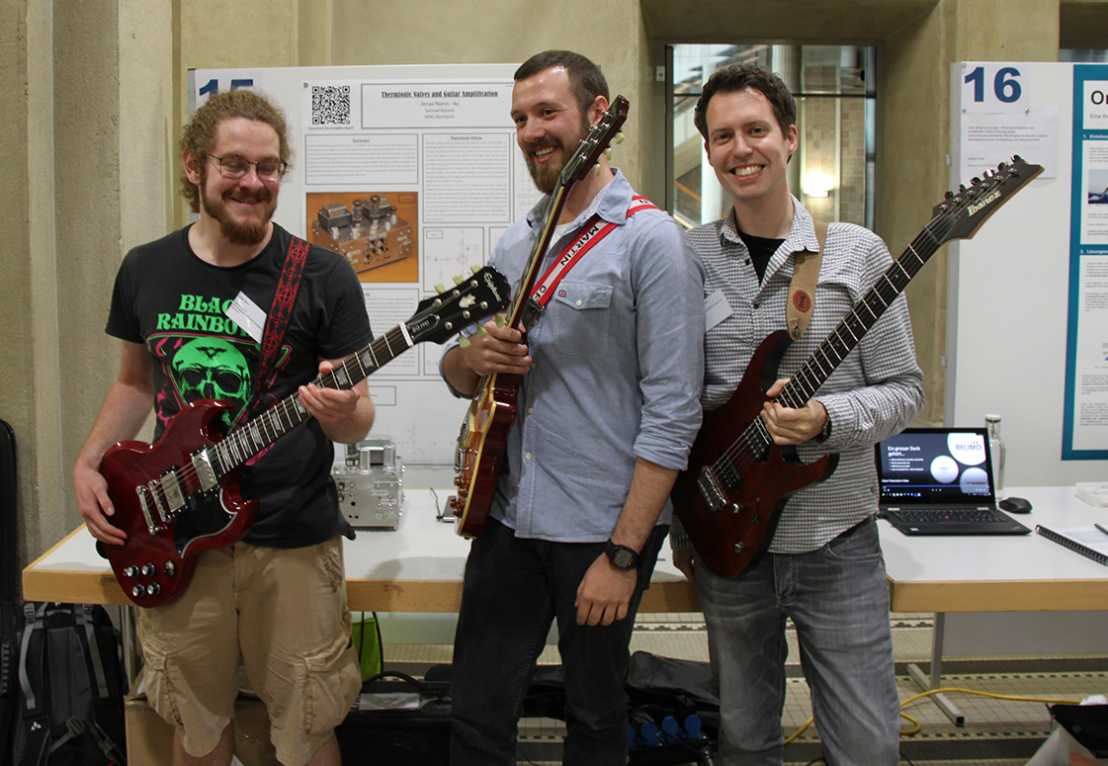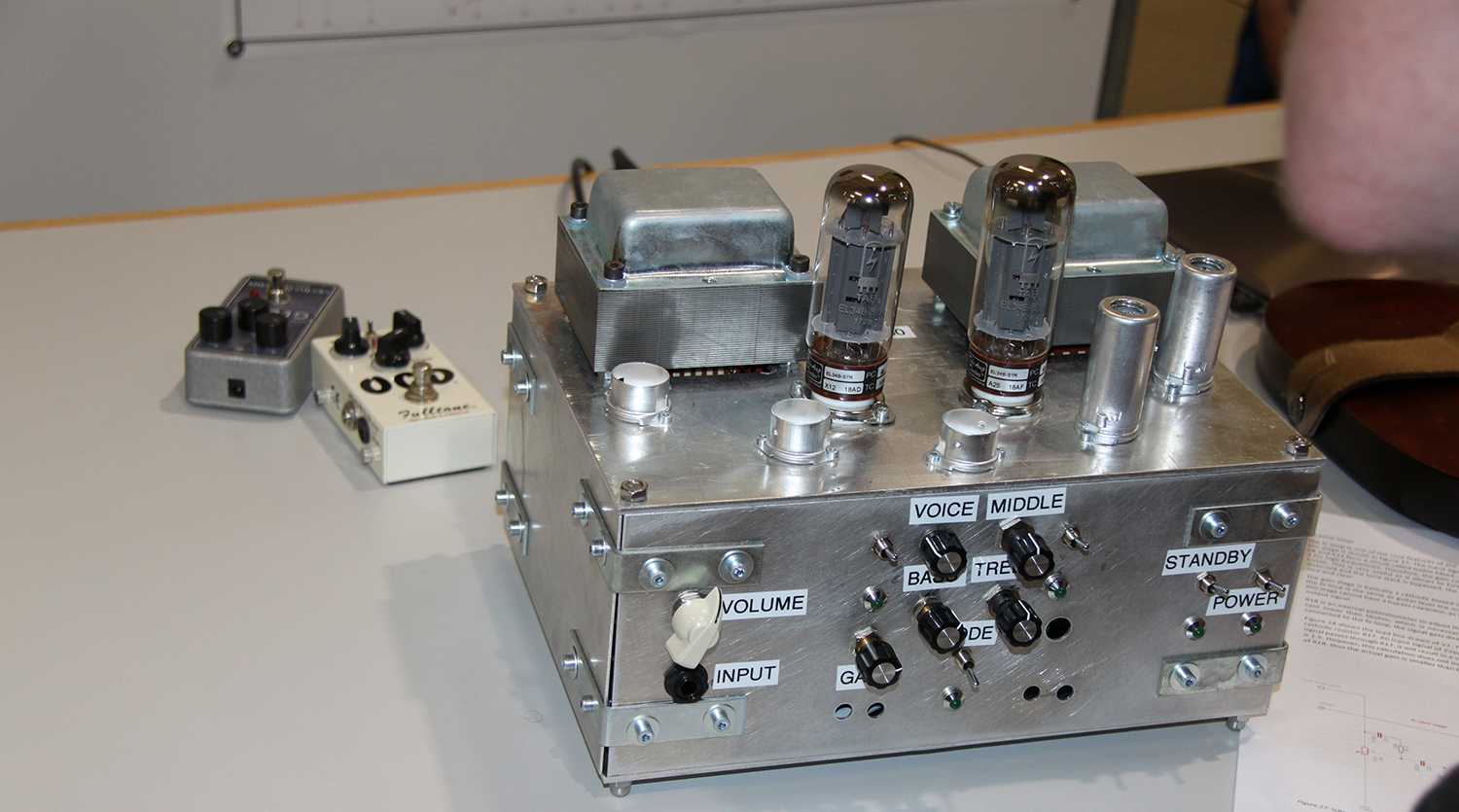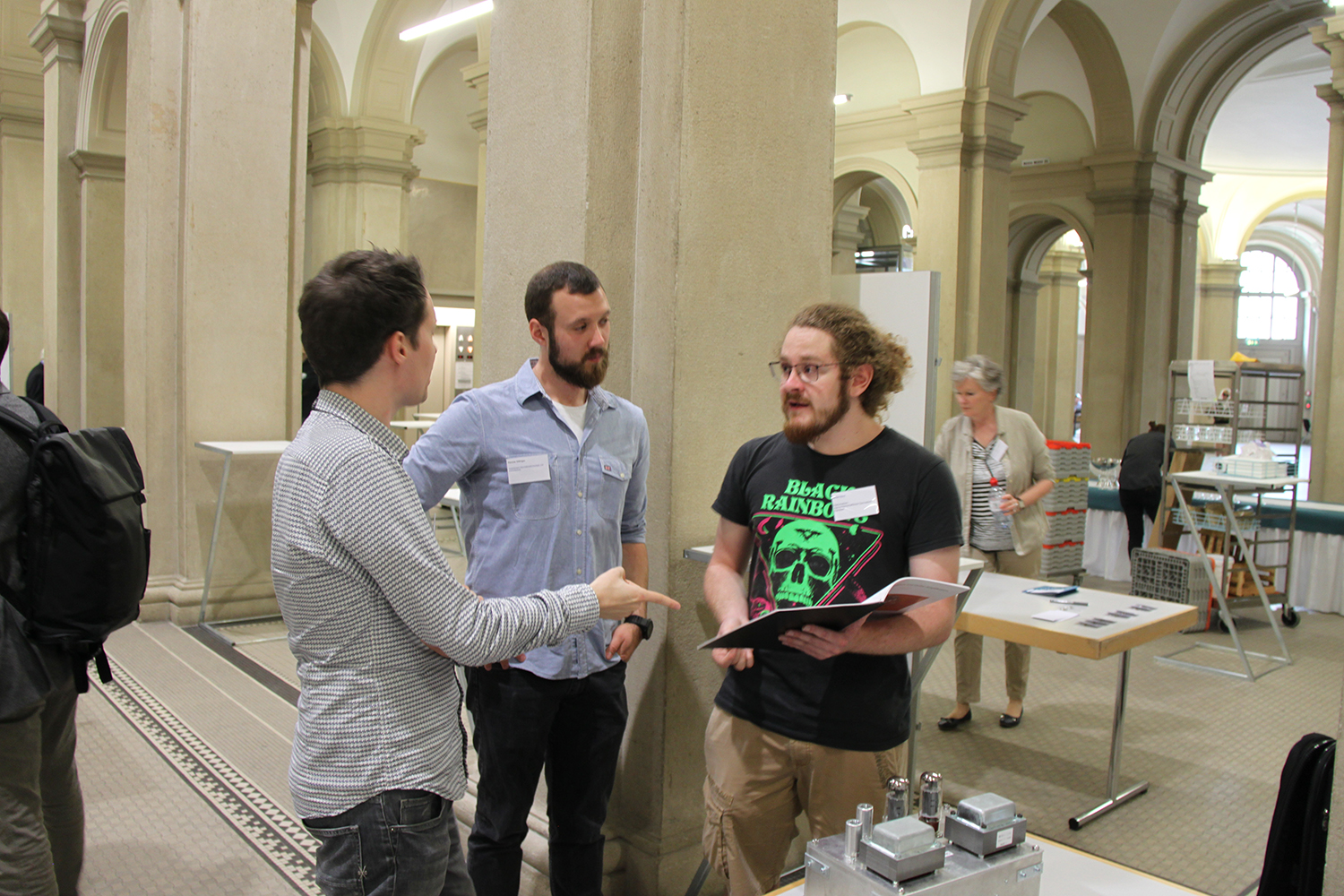D-ITET's guitar geeks exchange ideas
On May 24, Hannes Dillinger and Robbert van Gorkum from the Institute for Biomedical Engineering talked to Jonas Nann, a student at MNG Rämibühl, about his work "Thermionic Valves and Guitar Amplification" at the exhibition of Matura theses in the ETH main hall. An interview about Jonas' Matura thesis and his choice of studies for the coming autumn semester.

The exhibition of Matura theses related to STEM (science, technology, engineering and mathematics) subjects, organized by the Student Services (StS) of ETH Zurich, has already taken place for the 18th time. Once a year, high-school students from all over German-speaking Switzerland are given the opportunity to present their work and discuss it with ETH experts.
Jonas Nann, a student at the Mathematisch-Naturwissenschaftliches Gymnasium (MNG) Rämibühl in Zurich, designed and built a tube amplifier for his guitar as part of his Matura thesis. He met Hannes Dillinger and Robbert van Gorkum, PhD students at the Institute for Biomedical Engineering, who play both the guitar in their spare time and are also familiar with guitar amplifiers.
Katja Abrahams from the Communication & PR department of D-ITET met the three of them at the exhibition.
Jonas, how did you come up with the idea of building a tube amp for your guitar in your final year project?
Actually two things came together. I play electric guitar and have always been technically interested. Moreover, I had also already tinkered a bit with guitar effects. When it came to choosing the topic for my final year project, I told myself that building a guitar amplifier would be the perfect challenge for me, both theoretically and practically.
What kind of music do you play?
Actually mainly hard rock, but also "70s style", e.g. Jimi Hendrix.
And your musical preferences, Hannes and Robbert?
Hannes: Similar. I'm more of a campfire player.
Robbert: I also like to play hard rock, but especially cover versions on the acoustic guitar, among others by Michael Hedges and Andy McKee. Sometimes I do solo appearances at open mic events in Zurich.
Jonas, what's so special about your amp?
My goal at work was to understand tube circuits well enough to design and build a working amp myself. Of course, there would be many famous amplifiers to imitate, but my goal was to make something of my own. So it's not a copy of an existing amplifier.
What were the biggest challenges and lessons learned for you?
The construction of the amplifier was not only an electronic and technical challenge, but also a manual one! That's why I adapted the circuit over time. I'd never worked with tubes before, nor on such a big project. I'd only had experience with fuzz pedals before, so it was a big learning process and there are a lot of optimizations and details I'll consider when building the next amp.
Can you give some more technical details about the amplifier itself?
The end product runs with 2x EL34 and 2x ECC83. The preamp is kept pretty clean, and distortion can mainly be created by combining it with effect pedals (booster, fuzz, etc.). The EL34s in the power amp give the amp a certain character and a compressed sound, which was also the reason for the tube selection.
The available controls are a classic 3-band tone stack, a master volume, a gain control and a voice control. The gain works a bit differently than most amplifiers. Since the amp is kept "clean", the gain control is frequency dependent, allowing the bass and low mids of the amp to be adjusted even better.
The voice control is quasi the heart of the amp when it comes to adjusting a good sound. The button changes the frequency response of the tone stack: On the left are sounds with a lot of "fat" mids that remind you of Oranges. Half way you can still find some middle-heavy, but clearer sounds, which could be compared to Marshals. On the right side are finally glassy, "scooped" settings as they are known for Fender.
Which other technologies have you dealt with in more detail before?
In 2015, at the age of 15, I wrote a thesis for my school-leaving certificate entitled "external page Understanding computers and building them myself", because at that time I was very interested in gaming, but also in how computers work. It's a step-by-step guide to assembling your own computer, and so far I've sold about 200 to 300 copies, which surprised me a lot, but of course made me very happy.
You will start your Bachelor studies in Electrical Engineering and Information Technology at D-ITET in autumn. What was the decisive factor for this decision? My father studied chemistry at ETH and introduced me to the natural sciences at an early age. Last September, I attended the study information days at ETH Zurich. There I informed myself about the various courses of study. Originally I wanted to study computer science, but then I realized that a degree in electrical engineering was exactly the right thing for me, because it is very interdisciplinary and offers many different specializations and possible professions to me. I'm really excited to start my studies!
All the best for the Matura and for your studies! Who knows, maybe some day you will have the opportunity to rock a stage together with Hannes and Robbert!

